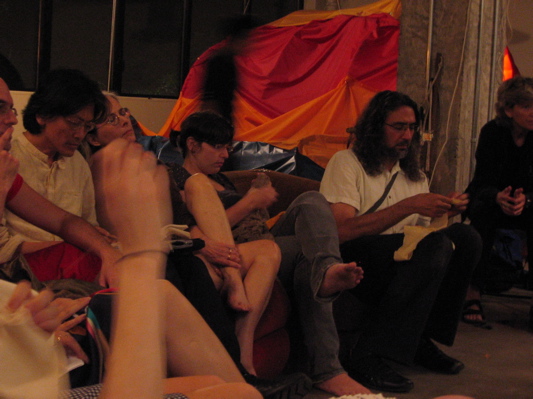
While at the Housing the Body (or here) event in Montréal, I’ve been wondering not only about the immanent critique of concepts in practices, but also about the way that practices, almost automatically, immanently critique themselves. This is not a matter of judgement - whether they are good or bad, better or worse, and certainly not whether they are true or not. It is not even only a matter of whether they fit or not, or whether they, as Deleuze says, “bring us forces or take these away from us”. It is more than this. It is, in Bateson’s terms, a question of ecology - of what I might call an accidental ecology.

To put this simply, a normal conference - a bit like the tick Deleuze discusses in The Fold - can get by with very clear or distinguished perceptions (at least in terms of structure). Give a paper (in tick terms “find the best place to burrow”), get some feedback (thankfully not always predictable although often, like the tick, involving an “olfactory perception of its prey”), have coffee (”a perception of light”), go out and drink too much (well some do). Wonder which city you’re in next morning (not necessarily because one has drunk too much). It’s a fairly regulated ecology - perhaps not too different from that Bateson writes about concerning alcoholism (where it is difficult to escape not because of the relationship between the drinker and bottle only, but because of an entire ecoloy of relations in which certain perceptions are distinguished and others remain obscure - Deleuze has a whole theory of appetites related to this in The Fold as well).

Housing the Body, on the other hand, gives up its “regulated ecology”. It offers a structured space for a whole huge range of events, micro and macro (platforms, each of them with their ecological complexity, readings, movements, foods, etc) that must come together immanently - but are “critiqued” by the much more complex - and determinately accidental - ecologies that emerge. This is a problem/advantage for research-creation in general. It must accept these accidental ecologies, indeed seek them, structure them in … indeed if research-creation structures anything - if it differentiates the remarkable in any regularity - it is that which will bring these accidental ecologies into being.

The risk of course is that there is something of a survival of the fittest, which again does not necessarily mean the best - simple that which best fits the accidental ecologies that emerge. Once again the importance of accepting failure - the failure of emergence - alongside the success, not only of the invention of concepts, but of remarkable singularities that emerge and form new structures of experience.
When something “works” it is very beautiful. When things don’t - as is inevitably, ecologically - the case, they return to more obscure, more chaotic world of micoperceptions which remains, however, that into which we will plunge again so as to find life once this ecology has reached its own accidental satisfaction.
At times I wonder, however, if the practices sacrifice themselves in their auto-critique - fuelling the conceptual work (which as always in events such as Housing the Body occurs at a high level) which boils down to wondering whether I am a philosopher or a pragmatist. They are not always easy companions.



